#i guess intergenerational trauma LMAO
Text
Everyone thinks I’m just this little nice girl like my ancestors aren’t from Mexico City!?
#the amount of intergenerational trauma I’ve inherited must be insane bc I felt like I was dying 24/7 up until like 2 months ago when I#learned how to heal my nervous system loll#idk what happened in my lineage but I have a whole lot of rage so it can’t be good lmao#everywhere you go in Mexico City you’re standing on the ruins of Aztec temples that the Spanish built over#that city is the embodiment of colonization and trauma lol#I guess that’s what I feel so weird about Mexico City becoming a fun tourist spot for white Americans#bc there’s no acknowledgment of the history of colonialism and slavery and violence that had made the city what it is today#let alone the experiences of people who live there now who are experiencing poverty and gentrification and neocolonialism by the US#I’ve been visiting Mexico City since I was a kid bc my grandma lives there but I never fully understood the history of the city#until I went to the downtown area where the famous church is and walked over the ruins of the temples that peek out as you walk#in the capitol building reminding you of the indigenous communities that were decimated to create everything you see in front of you#it’s a surreal feeling that I’ll never get over#personal
0 notes
Text
i just watched eeaao.............
#my posts#notes: i liked it#sadly i had to watch it half yesterday the other half today bc i did watch it with my parents and it was 'too long' to watch in one sitting#bc they like going to bed early which like. i respect them for that i just wanted to watch it... all at once.#ok out of puns! but yeah i liked it im sad the everything bagle thing gets lost in translation sadly#like they called the bagle a donut.............. sad its not like we dont know what a bagle is but i can get the everything part#as being hard to translate i dont exactly know what an everything bagle actually means like what does it have#is it the normal classic one i have no idea i never had a bagle and maybe i never will bc i also dont like cream cheese dgushig#... different notes none of my parents really liked it my dad didnt understand it to begin with rip#my mom got it but was like 'hm. i mean it makes sense i just dont like this kinda genre' :/ can respect that#idek if the reason i got it easy was bc i actually did or bc im chronically online tho i had tried to skip as many post about it as i could#i do know its a post in here that made me get the parallel of the bagle and the googly eyes tho but i do like that#and also i do like this kinda thing thats almost science fiction and the power of love and intergenerational trauma so like. yeah#.... also i love waymond sighsdug husband of the year#hm. i have nothing else to said unprompted i guess. ah wait i did like the other movie refferences that we could catch tho#anyways yeah that!#i can now stop skipping posts about this movie lmao
0 notes
Text
You love taking care of people: Fine Dining in the Time of Late Stage Capitalism
CW: this post discusses toxic and abusive workplaces and makes brief mention of institutional child abuse and intergenerational trauma. I might also talk about global systems collapse, for shits and giggles. Also this is another long one. You know the drill. Lets have a cuppa. Also this is my last minute submission to Sydcarmy Week 2024 and the theme of “you love taking care of people”. Enjoy!
I have a confession to make to The Bear fandom:
The food is my least favourite part of this show.
Its not that its not interesting. It definitely is. I'm a home cook and for the most part, I enjoy cooking (when I can do it at my leisure and not like most mothers, while balancing the mental load). I just find all the other aspects of the show much more fascinating.
In fact, I think this show about a bunch of cooks in commercial kitchens is so popular not so much because of its take up of cooking but its unflinching and loving interrogation of grief and trauma, including the kinds that get passed down through families.
The truth is, I've also never been overly excited about the world of "fine dining." I grew up in a large, Tamil family and so our meals were big, shared and not necessarily conducive to the minimalist plating preferred in exclusive, "gourmet" spaces:
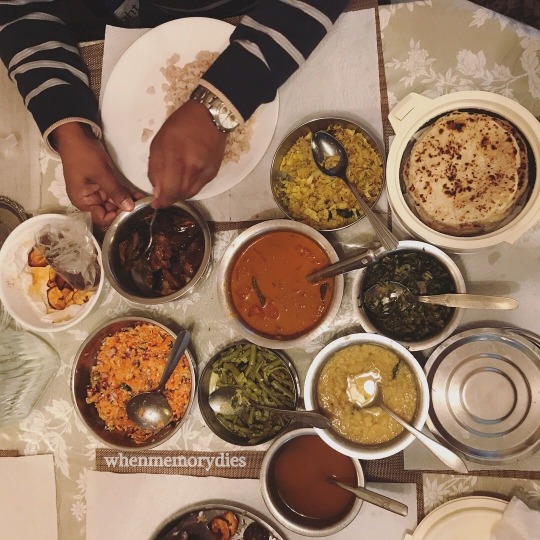
Photograph is mine, delicious Jaffna Tamil spread is the handiwork of my great aunt (Kunchi Ammamma or “little maternal grandmother”), arguably the best cook in our sprawling, extended family.
As tumultous as family life could get, I often experienced meals (that, lets be real, were almost always prepared by the women in my family) with my loved ones as a happy experience. I mean we also had our share of blow ups at the kitchen table but what was always consistent was the love and care that went into the food that we were given to eat. It was woven into the rich and complex flavours that made up the curries, varais, and sambals we had on our plates (and that even now, make me salivate just thinking about). It was spread throughout the warm, coconut-y rotis and steaming rice and puttu we ate with our hands and used to mop up all that spicy, flavourful goodness.
And if there's one question I heard more than any other from older family members growing up, it was "ni sappittiya?" ("have you eaten?"). More than "how are you?" and definitely more than "I love you." As with many Global South cultures, for Tamil folks, food is used for nourishment but also as a primary means of conveying deep care. Obviously Tamil people don't have the monopoly on using food to show their affection (or even the monopoly on using food to replace actually saying the words "I love you" lmao). Food has been found to increase interpersonal closeness and can also contribute to emotional regulation. Feeding a child is one of the first means of bonding between parents and children. Food also plays a big role in the course of romantic love: as a basis for first dates and future time spent with a partner, and of course also as an aphrodisiac.
As Cesar Chavez, Mexican-American civil rights activist, labor organiser and co-founder of the National Farm Workers Association (which later became the United Farm Workers union) said,
The people who give you their food, give you their heart.
You love taking care of people
Conveying care and love through food is a theme that comes up repeatedly in The Bear. Recall 1x02 Hands and the phone conversation with Nat and Carmy:

Natalie: Chefs always say a big part of the job is taking care of people, right?
Carmen: Yeah, yeah. No I guess.
Also recall an almost identical bit of dialogue between Carmy and Sydney, under the world's most famous table that had absolutely nothing wrong with it in 2x09 Omelette:

Carmen: You love taking care of people.
Sydney: Yeah I guess.
Here's some further mirroring between Sydney and Carmy about giving people joy through food. Recall again the phone call between Carmy and Nat in 1x02 Hands:
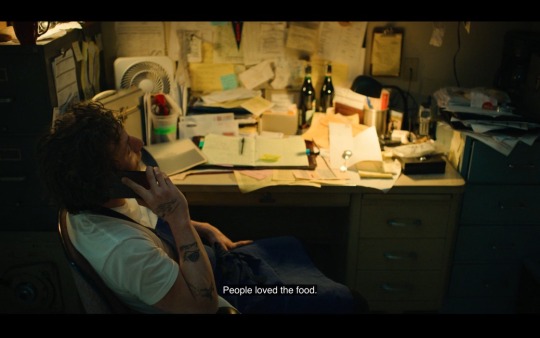
Natalie: When did the breathing problem start?
Carmen: I think maybe sometime in New York. I was throwing up every day before work.
[...] Chef was a piece of shit.
Natalie: Then why'd you stay there?
Carmen: People loved the food. It felt good.
Also recall the conversation between Sydney and Marcus in 1x08 Braciole:
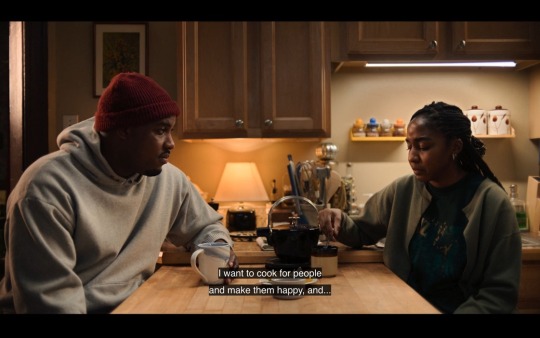
Sydney: I want to cook for people and make them happy, and give them the best bacon on Earth.
Be gentle with each other, so that you can fight stronger together: seasons 1-2 of The Bear
As rough and tumble as The Beef was, the clear throughline in season 1 (when The Beef was in operation) was the importance of the relationships and care between the show's characters. This was also the case in season 2 where the majority of the season was spent in the context of renovations and training prior to the opening of The Bear (in that season's last episode).
In season 1, we had Carmy leading the crew at The Beef by being patient, clearly explaining technique and positively reinforcing his staff's work.

Above left: Carmy walking the BOH crew through making Donna Berzatto's Lemon Chicken Piccata in 1x05 Sheridan. Above right: Carmy encouraging the crew to keep up their current pace in 1x06 Ceres.
We saw him working with Sydney, supportively encouraging the team to go further, to push themselves. We even saw Carmy at ease enough to talk about Mikey and his mother while at work. We had a Carmy showing us how integrated he can be.

Above: Carmy and Tina in 1x05 Sheridan
Heck, we even had a Carmy who wanted to get a compost installed at The Beef for processing food so that it didn't go to waste. Recall this golden bit of dialogue between him and Sweeps in 1x01 System:
Carmen: Eh yo Gary, you set up a compost for me today, Chef?
Sweeps: After I do my thing in the place.
Carmen: That's very clear. Thank you.
We had a Carmy who had time. Recall the below scene in 1x02 Hands before Sydney gives Carmy her draft business plan for The Beef (that she drafted on her own initiative and time to support his family's struggling business. If this man doesn't hurry up and fight for her in s4 istg...):
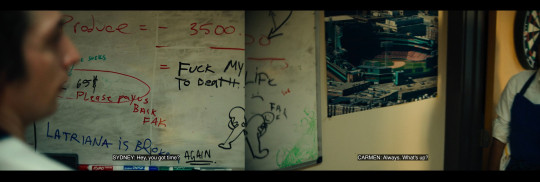
Sydney: Hey you got time?
Carmen: Always. What's up?
Similarly, we had Carmen in the first episode of season 2 making time to talk to a clearly distraught Richie:
Richie: Yo you ever think about purpose?
Carmen: I love you, but I do not have time for this, alright? *starts to walk up the stairs out of the basement*
Richie: *Nods, looks dejected, sniffs*
Carmen: I have time for this. *comes back down the stairs and sits with Richie*
Most pointedly in season 1 we had the conversation between Sydney and Carmy in 1x03 Brigade which lays the blueprint for their joint vision for the restaurant and which should have acted as a touchstone for both of them in season 3:

Sydney: You know, I think this place could be so different from all the other places we've been at. But in order for that to be true, we need to run things different.
When I said I didn't think that the brigade was a good idea, you didn't listen. And its not that you told me that I had to. [...] But you just didn't really listen and if this is going to work the way that I think we both want it to work [...] I think we should probably try to listen to each other.
Carmen: Yeah. You're right.
Sydney: The reason I'm here and not working somewhere else, or for someone else, is 'cause I think I can stand out here. I can make a difference here. We could share ideas. I could implement things that make this place better. And I don't wanna be wasting my time, working on another line or tweezing herbs on a dish that I don't care about, or running brunch, God forbid.
Carmen: *nods vigorously*
In season 2 while The Beef undergoes its facelift into The Bear, some of the show's most beautiful moments were when characters displayed their faith and trust in one another. Recall 2x01 Beef where Sydney asks Tina to be her sous chef, or 2x02 Pasta where Sydney and Carmy send Tina and Ebra to culinary school (and Tina's unwavering belief in and support for a nervous Ebra once they get there), and 2x03 Sundae and 2x04 Honeydew where we see Carmy and Sydney send Marcus to Copenhagen to stage with Chef Luca and build up his skills as a pâtissier.

So what happened at The Bear?
Season 3 of the show has been the most divisive of the series, with its preceding two seasons being almost unanimously adored by fans and critics alike. There's been a lot of debate on here and elsewhere as to why this is the case. What appears to be a dominant line of reasoning in this regard is the shift in Carmy and his approach to running The Bear as a fine dining institution.
At The Bear, we have Carmy as an Executive Chef who's berating, hostile, and blaming everyone else for his emotional state ("You guys are fucking killing me"). We have a Carmy who has taken "every second counts" to a point so minute that he has given up smoking because of the time away from the kitchen that it will cost him. We have a Carmy who has no patience for his team, almost all of whom have no experience working in fine dining before the opening night of The Bear. We see how out of sync Carmy and Sydney are ("Been off"). We have a Carmy who is reverting to patterns of behaviour that have been modelled for him by two of his abusers: his mother, Donna Berzatto and his previous boss, Chef David Fields, Executive Chef at Empire.
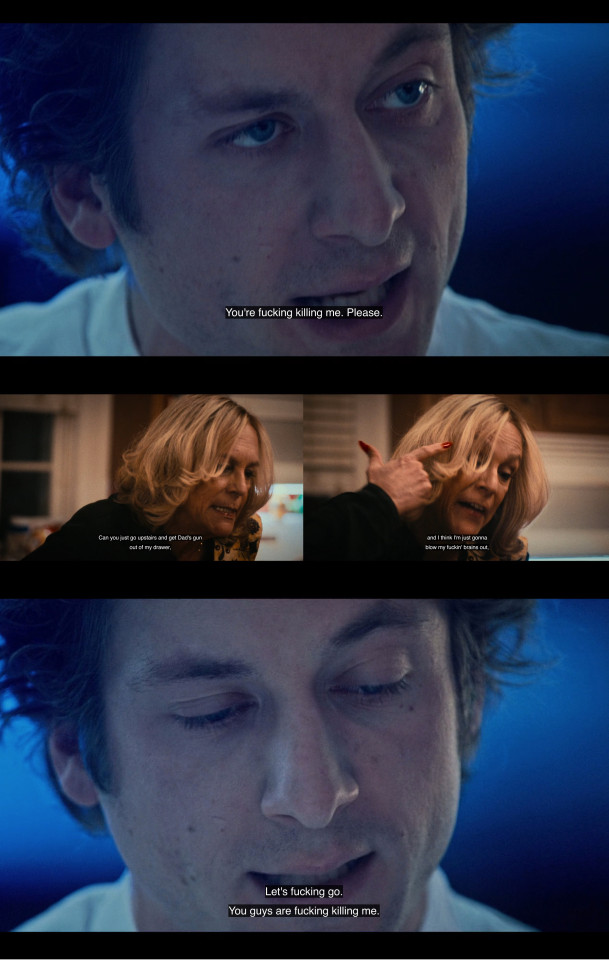
Perhaps second only to Donna and her stand in Claire, Chef David Fields' toxic legacy haunts season 3 of The Bear.
This is nowhere more clear than in the sheer wasting of food and money in season 3 epitomised by Carmy's insistence on changing the The Bear's menu every day (to quote Tina: "Every day, Joffrey Ballet?!") and his repeated throwing out of dishes he deemed "not perfect."
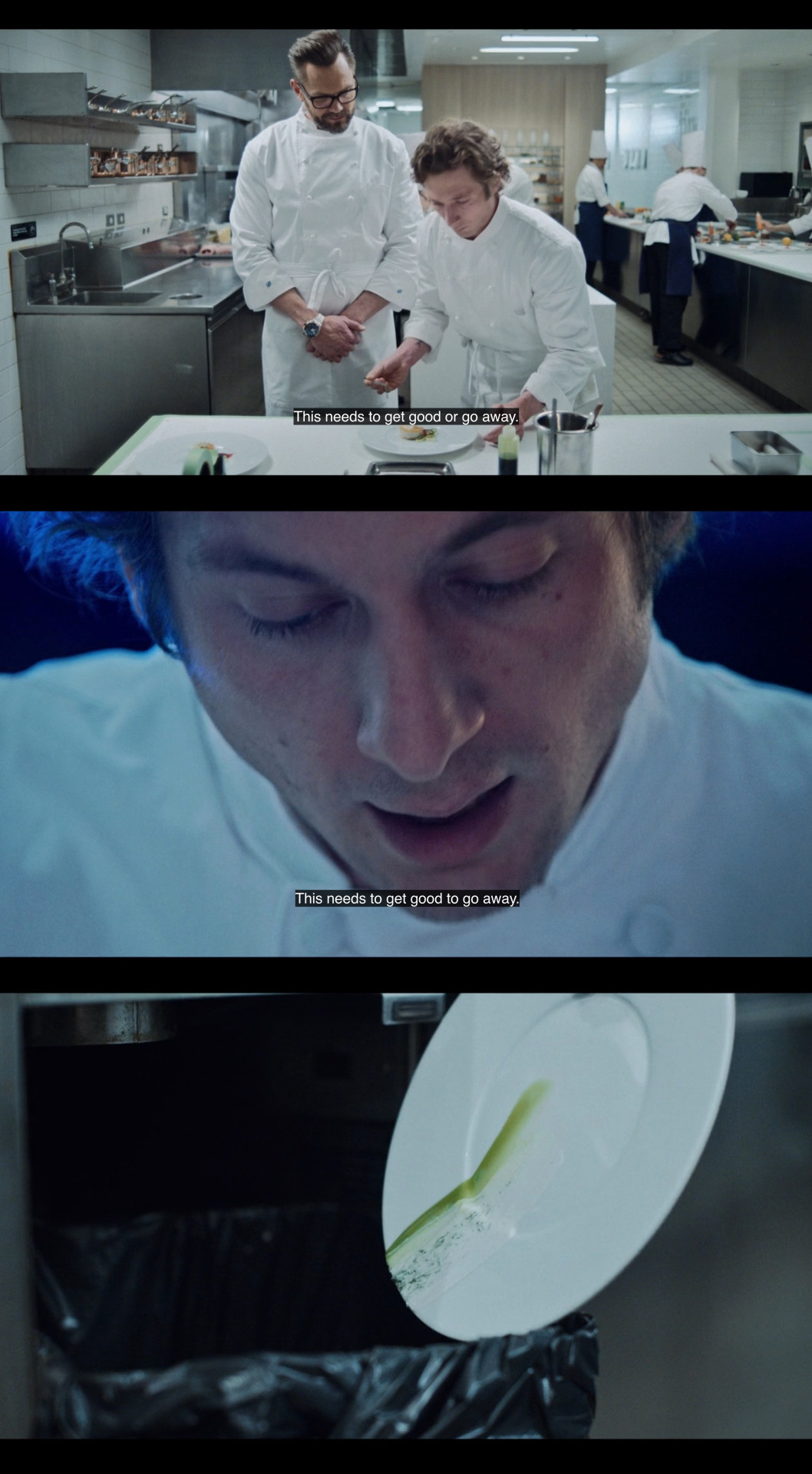
The waste did not go unnoticed by other characters on the show. Recall Natalie telling Carmy off in 3x03 Doors:
Natalie: The menu cost is out of control.
Carmen: Nat, figure it out.
Natalie: Oh. Oh. Figure it out? Wow.
Carmen: Figure it out.
Natalie: Why don't you fucking figure it out?
Carmen: I'm trying to use less shit.
Natalie: Okay, well, whatever you're doing, the R&D [research & development] of that, its fucking us.
Carmen: Well, we're using the best shit.
Natalie: Duh. Duh. Well, duh.
Carmen: Duh? Don't duh. No duh. [lmao this dialogue]
Natalie: Don't buy fucking crazy shit and then use it once, Carm. It's so wasteful. Duh! Duh, duh. Fucking duh, bro.

In episode 3x05 Children, Uncle Jimmy commissions The Computer to come in and run analytics on The Bear in an effort to get its costs under control (LOL at his assessment below, scrawled on the back of the dodgiest looking pie chart I've ever seen):

Computer: This sample is based on the month and a half we've been operating and does not take into account any funds spent previously on build, friends and family budget, other assorted fuckery.
Carmen: I mean, there hasn't been that much fuckery.
Cicero: Oh neph. You specialise in the fucking fuckery, bro.
Uncle Jimmy had plenty to say about Carmy's use of the former's funds (which Jimmy has duly invested in The Bear to support his nephew) including Carmy's decision to spend $11,268.00 on Orwellian butter (aka Dystopian Butter from the Fucking Rare Transylvanian Five-Titted Goat, lmao).
Even Carmy was under no delusions about how wasteful he was being this season. Recall his discussion with Sydney in 3x05 Children:
Sydney: You know what we should be doing?
Carmen: Produce vendor. You don't have to say it.
Sydney: Okay, I didn't say it then. I didn't say anything. Do you want me to say something?
Carmen: That I'm jamming us up 'cause we have a new menu every day and the economics aren't great?
Sydney: Well, I'm an accomplice, so...
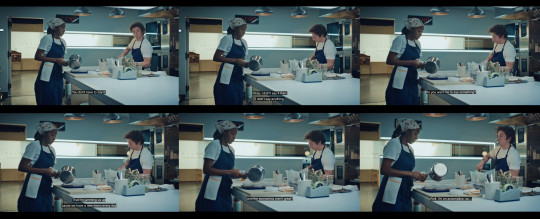
Note: the language in this small bit of dialogue struck me as being off. Why does Sydney needs Carmy's permission to say anything? Its like she knows that he knows the constantly changing menu and exorbitant expenses are an issue but doesn't want to say anything until Carmy brings it up first. @yannaryartside has a great break down drawing the analogy between Sydney's "accomplice" confession here with Molly Ringwald's (sorry I dunno what her character's name was) confession about facilitating her partner's substance abuse, during an Al-Anon meeting in 1x03 Brigade.
We have Carmy repeating harmful patterns of behaviour at work that he has picked up from his personal life (for example, from his mother) but also from his professional experience.
The world of fine dining that both Carmy and Sydney came to The Beef from was marked, by their own admission, with "complete and utter psychopaths" who screamed, pushed and yelled at their staff (recall Sydney's disclosure to Carmy at the end of 1x05 Sheridan) or "fucking assholes" (in the case of Chef David Fields), who made their staff "very, probably mentally ill." Sadly, this aspect of The Bear is not fiction. @moodyeucalyptus pointed out in this post that both Carmy and David Fields appear to have elements of their characters based off of real life fine dining wunderkind Chef Charlie Trotter: a Chicago-based chef known to be brilliant but who mistreated his staff so badly that he had two class actions brought against him (one by FOH staff, and another by BOH staff led by James Beard Award winner Beverly Kim).
There are other stories about the grinding nature of the fine dining industry which we'll get into below. We'll also look at a few stories of chefs who are leading a renaissance away from the "toxic, hierarchical shit show" that has historically plagued fine dining and who Joanna Calo and Chris Storer may have front of mind as they take us through Carmy and Sydney's journey together in season 4 (because as tempting as Shapiro's offer is, we know Sydney isn’t leaving Carmy). But first, we need to go further back in time to look at how the fine dining industry itself has created the conditions for a chef like season 3 Carmy to exist in the first place. Lets look at the system, baby (to quote Tina in 1x01).
The Bear's culinary ancestry: Chef David Fields and the Fine Dining Industry
I should say that I did not want to go too far into history with this post. After Carmen, Natalie, and the Berzattos, I was committed to trying to write shorter meta (/snort). But I'd be remiss if I didn't talk about the origins of fine dining, and before that, the rise of Europe as the base of "haute cuisine" (which itself is directly tied to its history of colonialism and...Empire *badumbum* @freedelusionshere has made the point that The Bear writers have given Chef David's restaurant the name Empire purposefully and they're not wrong). All of this informs the current state of fine dining today.
Though France is often credited as the place where restaurants began (in the 1700s), its been established that folks were eating in communal restaurant settings all over the world, including in China about 700-600 years earlier. The origins of western fine dining (the tradition that Carmy and Sydney have trained within) however, are synonymous with French cuisine and the efforts of Georges Escoffier (who Carmy name drops in 1x03 Brigade).
The French Brigade
Escoffier was responsible for developing the French Brigade system of organising kitchen staff which is still used today in many restaurants worldwide, including at The Bear. The French Brigade was based on Escoffier's own military experience in the Franco Prussian War and was set up to identify roles in the kitchen and increase efficiency and consistency so that restaurants could scale their work to serve larger numbers of customers.
The thing with anything based on structures found in the military is that its going to replicate hierarchy (a chain of command is central to the running of military operations). In fact, much of 1x03 Brigade is spent with Sydney resisting what she identifies as the imposition of a "toxic hierarchical shitshow".
Mariya Moore-Russell, the first Black woman in the world to get a Michelin star (who also happens to be from Chicago) talks at length here about the benefits of the French Brigade for systematising commercial kitchens but also how easily it can get corrupted if the wrong people are in the kitchen. She says in those circumstances, the Brigade can quickly perpetuate, racism, sexism, perfectionism and "all of the isms." My fav quote from the video? When Russell talks about the French standardisation of cooking adopted by most kitchens in fine dining industry (at 23:39):
They were like okay, how do we take what Grandma does, what Mama does and make it you know efficient and consistent but also just extremely stressful for everybody involved? (lmao)
Note: Moore-Russell has a series of videos on YouTube about her experiences in fine dining which are very illuminating. She's also such an engaging storyteller. For example, watch "My path through the restaurant industry".
Service à la française to service à la russe
In addition to the French Brigade, another development in the history of western fine dining was the shift in styles of food service from service à la française to service à la russe. Service à la française ('service in the French style') involved serving all the dishes for a meal at once, allowing patrons to serve themselves. Think something akin to buffet style. See below for table layout using service in the French style from 1775:
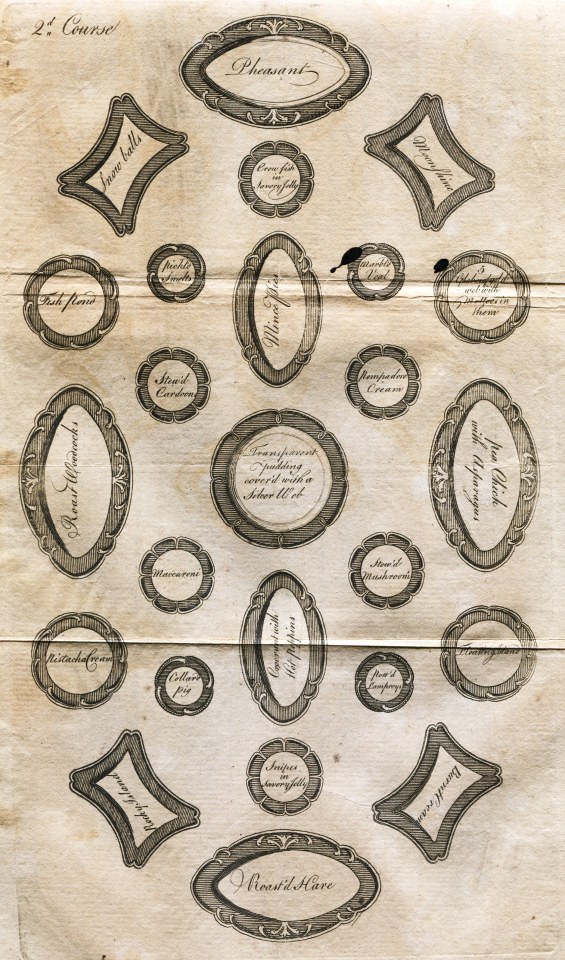
Source: Wikipedia.
To me, service in the French style looks kind of similar to how my Tamil family lays out our meals (as can be seen in the first picture of this meta, minus the pheasant, moonshine and roasted woodcocks...lol). This style of service also looks a whole lot like "family style" dining which can be described as: "when food is brought to the table on large platters or serving dishes rather than being individually plated. Guests then serve themselves from the dishes which are passed around the table." In fact, service in the French style or family style dining is how many cultures serve and eat their food, both in the home and in restaurant settings (whether they use these terms to describe that layout is another matter).
I also seem to recall a couple of soulmates Jeffreys deciding to open a family-style restaurant in 1x08 Braciole (which @bootlegramdomneess has also pointed out in her post here).

In the 19th century, service in the French style became replaced in European restaurants by service à la russe ('service in the Russian style'). This style of service is what Western fine dining and haute cuisine restaurants utilise to this day. It involves bringing courses to the dining table in sequence, one after the other. Courses are portioned and plated before being brought to the diner by service staff.
In the case of Western fine dining, Escoffier shaped haute cuisine ('high cooking') through the use of his French Brigade system and the implementation of service in the Russian style. Haute cuisine has undergone shifts and changes since the 19th century including with the nouvelle cuisine movement in the 1960s which was marked by a focus on fresh produce, paired-back menus and a focus on invention. Haute cuisine of today has been described as a fusion: employing elements of nouvelle cuisine and more elaborate techniques and processes from Escoffier's system.
To my mind, service à la russe involves a lot more people (definitely more wait staff) to have it deployed effectively. When you have more people, you have more room for error (like all those dropped dishes in season 3). Family style service or service à la française allows people to serve themselves. It encourages sharing. Personally, I prefer the latter. Also can we talk about how small the portion sizes are in haute cuisine? lmao. I get it, its art. You need a gigantic plate for a small piece of hamachi because thats the canvas. Some (read: me, lmao) might also say its big ol' waste to wash a plate that size for food that takes up maybe a 1/5 of its surface area. Can we also talk about the concept of "chargers" (which the Computer rightfully rips into Carm and Sydney for in 3x05 Children) - why do you need a table setting that no one's gonna use? I'm sure there's other aspects to haute cuisine that make no fucking sense but honestly this meta is gigantic enough as it is so I'll stop there lol.
Anyway, notably it is service à la russe and food that would be described as haute cuisine that we see at The Bear. Family style is nowhere to be seen in season 3.
Colonialism, Empire and the rise of Western food cultures
A fact that is often left out of discussions about why the French and other European countries developed such globally renowned food cultures as well as their staggering wealth and status as "first world countries" (particularly in the period between the 1600s to the 19th century) was that at around the same time, these nation states were expanding their own empires by colonising other parts of the world with the express purpose of acquiring ingredients (and other resources) that they did not have access to in Europe. A brief and non-exhaustive list of examples below:
Europe's demand for flavour was so great in the 1600s that the Dutch traded Manhattan to the British in order to secure the Indonesian island of Banda Run which, at the time, was the world's only source of nutmeg. When they first arrived in the Banda Islands, the Dutch killed and enslaved much of the Bandanese population, taking control of the island's local nutmeg plantations. This violence would come to be known locally as The Banda Massacres.
It was the hunt for a direct trade route with India for black pepper that Christopher Columbus used to pitch his voyage to the King and Queen of Spain and which ultimately led him to the Americas. Columbus' arrival precipitated the colonisation of the Americas, which resulted in enslavement, disease and outright genocide, decimating First Nations populations throughout North and South America.
The colonisation of the Americas would also lead to the exporting of various foods that have come to be staples in European cooking. For example, the tomato - the key ingredient in many Italian (and Italian American) dishes - orginated in South and Central America and was brought to Europe via Spanish colonists.
The British set up their infamously brutal East India Company (EIC) to control the Indian subcontinent and the trade of various resources including precious metals, opium, textiles (silks and cotton), spices (such as cinnamon, black pepper, nutmeg, cloves, mace) and other food items (like salt, sugar, coffee and tea). The EIC would later be supplanted by the British Raj in Britain's stranglehold on India and after almost 200 years of imperialism and economic fraud, it has been estimated that the British drained India of nearly $45 trillion. I can't even begin to fathom an amount of money that large but the British could, and that theft powered much of the empire during its height.
The influence of Indian ingredients and cuisine spread throughout the British empire, including back to Britain itself. In fact, through colonisation and empire, Indian influences appear in various global cuisines (including other European cuisines as well as in the Caribbean).
Indeed the British's impact on food globally included its colonisation of Australia and New Zealand. These two colonial outposts essentially became gigantic cattle and sheep runs for the British who facilitated the wholesale theft of land - and in the case of Australia, did so without even bothering to enter into treaties with First Nations people - in order to run livestock that was then exported to feed Britain.
In order to satisfy its sweet tooth, France operated huge sugar plantations on the backs of the labour of enslaved Africans, particularly in Haiti (known at the time as Saint-Domingue). In the late 1700s, Haiti was responsible for exporting 40% of all the sugar consumed in Europe. The human cost of this was high and brutally violent. Eventually in 1803, after many armed revolts, enslaved African-descent people kicked the French out of the country after over a hundred years of heinous exploitation (thereby creating the first Black republic in the world). The French were so economically dependent on the colony for its production of coffee and sugar that when Haiti got its independence, France decided to punish the new republic for the loss of future income on Haitian exports, demanding 150 million francs in gold as compensation. The French sent warships to enforce this cruel debt. All in all, Haiti spent approximately $21 billion paying off France for the freedom that its people had already lost their lives and shed their own blood for. The debt (which involved the fledgling republic taking out exorbitant loans and fundraising amongst its citizens) was not paid off until 1947: 122 years after it was initially enforced. The French even charged Haiti interest.
Were it not for its vicious history of slavery and its century-long extortion of its former colony, I'm pretty sure France wouldn't have had the quantities of a certain key ingredient necessary to develop its worldwide reputation for pastries and desserts. I mean, you try making a crème brûlée, an eclair, a tarte tatin, a sweet galette, a mille-feuille, a madeleine, a crepe...without sugar.
This history deeply informs fine dining today. For centuries, Europe underdeveloped much of the world (borrowing Walter Rodney's turn of phrase) through colonialism and imperialist extraction. It then used those spoils and excess wealth to, among other things, develop its own food cultures and then self-proclaim itself as the cutting edge of the culinary world. To be clear, you can only faff about in a kitchen and create fancy sugar palaces and 10-course meals if you have the means and resources to do so. Haute cuisine is a product of wealth and resources, accumulated over time. Europe's colonial history also dictates which cuisines are recognised via awards like the Michelin star system. Hell, it dictates why you have the French (Michelin is a French tire company) dictating what constitutes "good" food in the first place. If you want to read more about this topic, this essay on Medium provides a good overview of the sad, racist state of affairs over at the Michelin Guide.
Where Europeans colonised and settled, this same lens was applied. This is why you have the undervaluing of Indigenous cuisine and ingredients in Australia, a situation which has only recently begun to shift. The colonisation of Australia actively involved the lying about Aboriginal foodways in Britain's attempt to falsely claim that Aboriginal peoples were nomadic hunter gatherers who did not use their land. Its why the history of how enslaved Africans brought their food cultures with them through the Door of No Return and transformed American cuisine, is not more widely known. Its why so few chefs of colour have been recognised for Michelin stars globally.
Empire and The Bear
Season 3 of The Bear pays clear homage to the impact of European empire on the world of fine dining in a few ways. The most obvious is the fact that Chef David's restaurant is literally called "Empire" lol. Another example and one of the most visually striking to me occurs in 3x01 Tomorrow. First, recall Chef David Fields' outright theft of Carmy's dish (I think we've established that you can't get more empire than the theft of food, yes?). Can we talk about how not only did Fields steal Carmy's dish but also, turned it into the most beige meal we've seen on The Bear to date, bar that single sprig of dill fighting for its life?
Carmy's penultimate plate (the final version being The Best Meal That Sydney Ever Had™):
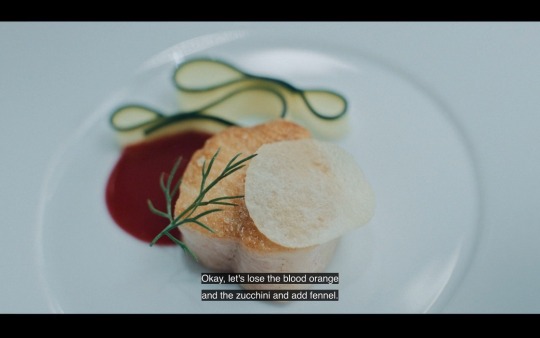
Chef David Fields' dick measuring exercise version:
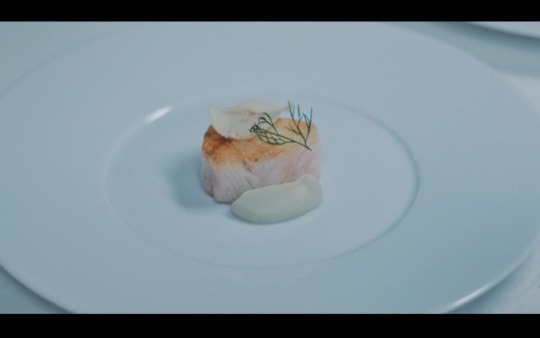
Carm was not a fan:

Can we talk about how the original plate featured the colours of the Italian flag (green, white and red) - emblematic of Carmy's cultural heritage and what is certainly one of the single biggest influences in his culinary journey (the dish also features fish, just like the main course in La Vigilia, the Feast of the Seven Fishes) - but after Fields was done with it, that shit was practically three shades of mayonnaise?
Can we talk about how Carmy's version of the dish almost certainly had a varied and dynamic flavour profile while Fields' looks just how I imagine it tasted like: whatever flavour meh is. The dish literally has no acid from what I can see (ingredients: paupiette of hamachi, fennel soubise, potato chip and dill). And I *know* a balanced dish has salt, fat, acid and heat (cos Chef Samin Nusrat told me).
Can we also talk about how Fields hates the most commonly traded of spices? The one that Columbus was looking for when he landed at what is now the Bahamas. The one that was an integral part of the East India Company's business plan rort to fuck India and South East Asia more generally?
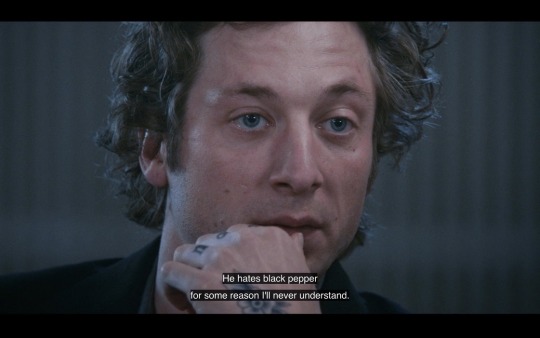
Carmen: He hates black pepper for some reason I'll never understand. (from 3x10 Forever)
White folks in Europe were so hungry for spices to liven up their food that they invaded large swathes of the rest of the world to get the stuff. And yet, here we have Chef Fields, disliking Europe's gateway spice: the one that the Romans (Carmy's ancestors) had been trading with the East for centuries prior to Europe’s imperial frenzy, and which now makes up 20% of the world's spice trade.
Is the man so dedicated to meh that he couldn’t even bring himself to embrace pepper? Used to be one of the best chefs in the world, is right Chef Luca.
On top of dubious taste (I'm not a food critic but no one can tell me that hamachi and fennel soubise dish tasted anything other than fucked lmao. idc idc), Chef Fields is also one of the clear antagonists in The Bear. Along with Donna Berzatto, he is one of Carmy's two primary abusers. His impact on Carmy was never as clear on the show as it was in season 3. Lets take a closer look at that impact below:
Culinary ancestry and intergenerational trauma
Both Donna and David are ancestors of a kind to Carmy. Donna is clearly a biological ancestor in that she's Carmy's birth mother. I've argued here that David Fields is a culinary ancestor to Carmy. For ease of reference, I'll include my explanation of what I mean when I say "culinary ancestry", from that earlier meta, here:
Most folks understand ancestry to refer to our family or genetic lineage. When I was in university, I learned about intellectual ancestors or genealogy: where one can trace your intellectual lineage - the thinkers and creators that have shaped your understanding of the world and/or your chosen profession. I think its useful to take this concept and apply it to The Bear to help understand what the show is saying about legacy. I wouldn't limit the concept to "intellectual" ancestry though. It might be more helpful to talk about culinary ancestors in this context because the process of creating food - crafting dishes - isn't solely an intellectual exercise. It engages our intellect yes, but also each of our senses, our memories (recall that chocolate banana from 2x10 The Bear), and the need to nurture and be nurtured.
Culinary Ancestors
Carmy's culinary ancestors are varied given his work history. We know he's cooked under some of the best chefs in the culinary world of The Bear, including: Daniel Boulud (of Daniel), René Redzepi (of NOMA), Thomas Keller (of The French Laundry), David Field (a sociopathic Joel McHale, of Eleven Madison Park Empire), and Andrea Terry (a sublime Olivia Colman, of Ever). I'd also include here Mikey, Donna and Natalie Berzatto. I'd include cousins Richie Jeremovich and Michelle Berzatto as well. These are the home and line cooks Carm grew up with, watched in his mother's kitchen and at The Beef. He took his lessons - the good and the bad, learnt voluntarily and involuntarily - from all of these people, incorporated them into his working self and transmuted them into his food.
NOTE: In "Ancestors and The Bear" and in other meta I've written, I've incorrectly noted that Chef David Fields was the EC at Eleven Madison Park (instead of Empire). This was due to the fact that up until 3x10 Forever, we are not told the name of the restaurant that Fields and Carmy worked at together. In the draft script for the pilot, the restaurant is identified as EMP (Eleven Madison Park) by Sugar (see p 23 of that script), however this appears to have changed to "Empire" during the course of the show's development.
Through the lens of culinary ancestry, there is a clear connection between Carmy's wasteful R&D and menu choices in season 3 with the "lessons" he received under the tutelage of Chef David at Empire. For example, and as discussed above, the refusal to serve any dish that isn't viewed as "perfect" led to extreme amounts of waste at both The Bear and at Empire.
Additionally, Chef David focused on "subtraction" (recall his writing "SUBTRACT" on green tape and sticking it to the expo of Empire in 3x01 Tomorrow) and never repeating ingredients in the dishes that came out of Empire. Instinctually, these two strategies appear to me to be techniques to create needless scarcity. They're attempts at repression in and of themselves. Carmy adopts these philosophies and tries to implement them at The Bear as well. They manifest in his unilaterally overhauling the original menu at The Bear (without Syd's input) as well as his insistence that the menu change every day.
Minimalistic subtraction of elements was also a characteristic of Escoffier's approach to cooking which would be taken even further with the nouvelle cuisine movement in France. That movement focused on minimalistic dishes with fewer seasonings and sauces. Chef David Fields is clearly rooted in the French school of fine dining in this approach.
Subtraction also shows up in the show in a more dire way: in the cutting off of relationships and the whittling away of self.
I recently come across a promo still for The Bear. It features Carmy as the CDC of Empire, plating a dish. I've seen the image before but I never noticed the writing on the wall next to Carmy before. It reads:
"Its only after we've lost everything we're free to do anything"
This quote also appears in the 1999 David Fincher film, Fight Club (which itself is based on the book by the same name by Chuck Palahniuk):

Left: Carmen Berzatto, CDC at Empire in The Bear; right: Tyler Durden, general nihilistic fuckwit in Fight Club, also preaching the gospel of David [Fields].
This ethos, written on the wall and haunting the kitchen at Empire is emblematic of how Chef David operates. It reads like a fucked Psalm, giving a poetic shimmer to Field's abuse. Chef David tears down his staff, verbally degrading them to the point that he has the gall to whisper "you should be dead" to them. (OK. Can we...for a minute...imagine being a manager and that being your management style? Telling your best performing staff that they should be dead? Excuse me, mon cheri? A literal devil).
Chef David literally strips his staff of their dignity and their connections to the outside world. He makes them lose their sense of self and claims its all to make them better chefs. He tells Carmen in 3x10 Forever:
Chef David: So you got rid of all the bullshit, and you concentrated, and you got focused, and you got great. You got excellent.
The parallels between Carmy's experience at Empire - and even in the Berzatto household - and the critique of performative violent masculinity that Fight Club was trying to get across are worth pointing out. In Fight Club, white men beat each other up to try and assert control over a perceived loss of power. At Empire, Chef Fields consistently berates and degrades Carmy, clearly threatened by his CDC's talent. Similarly we have Richie complaining about having to take orders from "toddler" Carmy, saying "I was a baby too once, Syd. Nobody gave a fuck" in 1x02 (which could have been the origin story of any one of the men who joined Brad Pitt/Edward Norton to carry out "Project Mayhem" lmao. In fact, I wouldn't be surprised if a lot of the dudes on Reddit fawning over Richie circa seasons 1-2 also watch Fight Club as if it was some sort of aspirational manifesto and not the satire that Fincher intended it to be).
Chef Fields is meant to be representative of a toxicity found in the restaurant industry globally. There have been numerous reports of the physical and psychological violence meted out against kitchen staff by those higher up in the brigade.
Additionally the structure of the French Brigade system is such that those at the bottom - stages - are often expected to work for free. While unpaid internships are common in various lines of work, those industries start to run into trouble when large amounts of their products and services depend on unpaid labour. In fact, darling of The Bear, René Redzepi of Noma faced criticism of his restaurant's unpaid internship program. The internship program was rife with stories of ridiculous working conditions. Redzepi finally began paying interns in 2022 but then announced that Noma would shut down regular service at the end of 2024 due to being unable to afford its staff (at one point, unpaid stages made up almost half of Noma's staff).
The fact that entry into the world of fine dining means people need to work for free as a stage automatically eliminates this as an option for folks who cannot afford to volunteer in order to gain work experience. This would disproportionately impact on certain communities, particularly communities of colour whose members may not have access to sufficient wealth that would allow them to work for free. This is clearly illustrated in The Bear where we see that Carmy has the safety nets and access in place that allow him to stage at various fine dining institutions and gain much sought after experience (e.g. his family's ownership of The Beef and his ability to work there, his cousin Michelle's restaurants in NYC and his access to those spaces). Sydney, Tina, Marcus and even Richie have very different entries into the world of restaurants and fine dining.
The issue of sexual abuse and harassment in the restaurant industry is also very subtly broached in The Bear (though it is more heavily implied in the draft script for 1x01), particularly in 1x07 The Review with Richie accusing Sydney of giving a food critic head in order to get a positive review for her risotto (season 1 Richie was genuinely the worst). But the issue is huge, with more sexual harassment claims filed in the US in the restaurant industry than any other field of work.
Even scrubbing floors by hand and cleaning with a toothbrush, while ensuring sparkling kitchens, have also historically been used as a means of punishment, particularly in institutional settings. During Australia's Royal Commission into Institutional Responses to Child Sexual Abuse, there were numerous reports of children in care homes being forced to scrub floors with toothbrushes as a means of physical punishment and control. (CW: the above link discusses accounts of institutional child sexual abuse).
Given the above, its clear to see that the industry - the system - facilitates a whole lot of shit that its workers are subjected to. So when Chef Adam Shapiro catches Sydney as she leaves the train station in 2x04 Violet and asks her how she's doing, her response is telling:
Sydney: It's been a long month [at The Bear].
Chef Adam: Ah. That bad?
Sydney: No, just-- Restaurants.
Chef Adam: Yeah. Right? Why do we do this to ourselves?
Sydney: 'Cause we're crazy.
Chef Adam: Yeah. What was this month's crazy?
Sydney: Um. The kind that's inherited.
Chef Adam: *Nods emphatically* Understood.
This Financial Times article on the dark side of restaurant culture in Copenhagen, sums things up perfectly:
“We always had this joke, an explanation for why things are so horrible: shit falls down,” [Chef Levi] Luna told [the author Imogen West-Knights], with a cold laugh. In the kitchen, the head chef gets mad at the sous-chef, who gets mad at the person below him, a chef-de-partie, who then takes it out on a stagiaire. Then one day, the sous-chef is the head chef, and he has learnt how a head chef behaves: badly. It should give a sense of the strength of feeling I encountered about how damaging this system is that several people independently described it as being like children who are abused going on to commit abuse as adults. This is the dark flipside of the restaurant-as-family metaphor.
Challenging the status quo @ The Bear
By the end of season 3, Carmy appears to recognise that subtraction in his life is not going to bring him happiness. In fact, in 1x08 Braciole, he identified subtraction - specifically, the cutting out of people from his life - as the reason his life got quiet as he grew more isolated. In 3x10 Forever, when he finally confronts Chef David, Carmy laments the psychic and physical impact of Fields' abuse as well as the isolation it engendered. Fields, psychopath that he is, remained unfazed:
Carmen: You gave me ulcers, and panic attacks, and-and nightmares. You--You know that, right? Do you-- Do you understand that?
Chef David: Yeah, I gave you confidence, and leadership, and ability. It fucking worked.
Carmen: My life stopped.
Chef David: That's the point, right?
Additionally, its worth pointing out that despite all the focus on precision, minimalism and (quite frankly) rage being put into the impeccably plated dishes of The Bear, it's the messy, juicy, multi-ingredient filled Italian beef sandwiches that remain the site's best seller. Indeed, in 3x05 Children, Nat tells Carmy that the sandwich window is the only thing at The Bear making any money. So much for subtraction.
We also see Carmy resisting a total acquiescence to Chef David's approach to running a kitchen early on in season 3. His non-negotiables read in the hindsight of the entirety of the series like his attempt at integrating the lessons he’s learned from various kitchens. It’s why the list says “no repeat ingredients” AND “vibrant collaboration”. We know that vibrant collaboration had to come from someone else’s kitchen cos Fields certainly wasn’t collaborating with anyone. That asshole was out there dictating like a fascist.
Additionally, while Carmy has realised the dangers of the fine dining industry by the end of season 3 (and not for the first time - recall in 2x01 The Beef when he called the Michelin star system "a trap"), and while Sydney grapples with her role as an "accomplice" to Carmy's season 3 bullshit, their protégés Tina and Marcus continue to keep the flame of genuine care, collaboration and inspiration alive. This is most clearly seen during the conversation Tina and Marcus have in 3x09 Apologies where they discuss Marcus' mother and his memories of her as well as brainstorm ideas for Tina's cauliflower, brussel sprouts and horseradish dish (please for the love of gad, give us more Tina, Marcus and Ebra next season).
Challenging the status quo in the real world
There are also actual chefs in the real world who appear to be doing something different with their work: embracing their own food cultures that have historically been locked out of the world of fine dining and also trying to run their kitchens in more egalitarian ways.
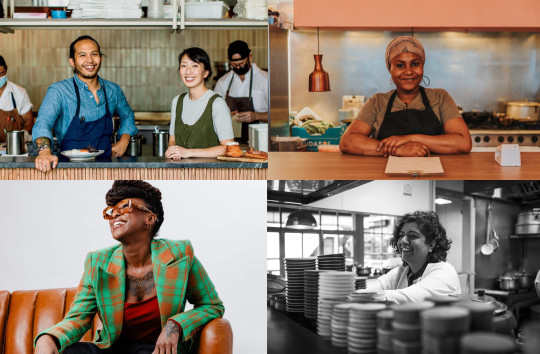
Above clockwise from top left: Chefs Tim Flores and Genie Kwon of Kasama, Chef Adejoké Bakare of Chishuru, Chef Asma Khan of Darjeeling Express and Chef Mariya Moore-Russell formerly of Kumiko and Kikkō.
The first, most obvious example of this for The Bear fans is Kasama, (shout out to @currymanganese and @thoughtfulchaos773 for introducing me to the above linked, short doco) the Filipino American restaurant founded and run by Chefs Tim Flores and Genie Kwon (who also happen to be married) in Chicago. Kasama is also where Carmy and Syd were meant to have their palate cleansing "reset" in 2x03 Sundae and where Sydney may have also been hit on by fellow Coach K fan, Kasama bae (shout out to @sydcarmyfan for verbalising what I squee-ed about on first watch of this episode lmao).
Both Flores and Kwon come from fine dining backgrounds but appear to challenge some of that industry's basic tenets, including the messianic role of the EC as top of Escoffier's brigade food chain. Flores openly states that his cooking is an ode to his Filipino mother who regularly taste tests his food. In the Nick Cavalier doco linked above, Flores states "if [his mother Lolly Flores] eats [the food] and there's no reference to her dish at all, I'm not doing the right thing." Flores and Kwon also operate Kasama using a hybrid model (that I think would send regimental Escoffier into a tailspin) where they offer fast and casual service featuring Kwon's baked goods during the day and offer a Filipino tasting menu led by Flores for dinner service only. Kasama was awarded a Michelin star in 2023, the first Filipino restaurant in the world to achieve that title. It also took home a James Beard Award that same year.
Note: if you haven't already, have a read of this interview of Tim Flores and Genie Kwon conducted by the Michelin Guide. ISTG Storer and Calo have read this and lifted whole paragraphs for The Bear's script. An excerpt that stood out to me, in particular:
The two first met at Bib Gourmand restaurant GT Fish & Oyster, also in Chicago. "He was leaving as I was starting. So we didn't overlap for very long. But I actually went to eat at the restaurant that he was working at afterwards, and I had one of the best experiences of my life at a tasting menu. And after that we started talking and hanging out, and eventually started dating," recalls Kwon about how she and Flores first met.
Sounds a lot like a couple of Jeffs we know, yes?
Also check out Chef Adejoké Bakare, who in 2024, became only the second Black woman to get a Michelin star in the world (the first being Chicagoan Mariya Moore-Russell who announced in 2020 that she was taking a break from her career for her mental and physical wellbeing and who also...is married to a chef lol). Bakare's restaurant, Chishuru in London, specialises in West African cuisine rooted in Bakare's Yoruba, Igbo and Hausa cultures. Bakare, like Genie Kwon, has a background in biological sciences. She also began her career as a home cook, then ran a fish and chip cart while studying at university in Nigeria. Once she moved to the UK, she ran a supper club and later won the opportunity to run a short term pop up restaurant. During the ceremony where she got her Michelin star, Bakare noted "[i]t did feel rather odd at last night's ceremony that 90% of the room was white middle-aged men. But the passion I see among young women in the industry is such that I'm confident things will change."
Take also Chef Asma Khan, who got her start in the industry as a home cook and then began running supper clubs out of her house in the UK. She then opened up the Darjeeling Express with a group of South Asian women she had met when they were all fairly recent arrivals in the UK, none of whom had formal culinary training. To this day, her kitchen remains fully staffed and run by women.
In this TEDx Talk about her work, Khan says:
"I wanted to cook but I actually wanted to feed people. This gave me the greatest pleasure. I felt at my most powerful when I was able to serve someone something I had cooked. In some ways it was my way of showing affection and love, and being able to give them something that took them home."
Sounds familiar yes? Like a couple of Jeffreys in season 1 of a certain show?
About the systemic sexism in the industry, Khan says:
"But at that time, in England, anywhere in the West, everywhere you looked it was male chefs you saw that was on television [...] in the media. It was always about men who were cooking kitchens. The greatest irony of it all is that [...] in every South Asian home you go to, you will invariably find a woman [cooking] but in every South Asian restaurant you go to, not just in India but in Pakistan, Bangladesh, Sri Lanka, almost everywhere in the world, you will usually find a man cooking in the kitchen. And it was a desire for me that I wanted to cook but there was no road or route in front of me."
Khan elaborates further on the skewed and gendered manner in which elite fine dining operates, in this article:
“There is no public hanging [in her restaurant]. Male chefs have made cooking into a combat sport. I think it’s a reaction to the idea that cooking is feminine: I’m not the dinner lady! I’m not your grandmother! Sorry, but if you’re constantly screaming at staff it means you’ve trained them badly.”
Khan is describing the hyper-competitive nature of fine dining (and her suspicion that in a highly gendered industry that is populated by majority men, that there is a need to perform a hypermasculinity in order to put distance between themselves and the historically feminine-gendered roots of the act of cooking) and how Khan wanted no part of it, for herself, her staff or her patrons. In this Guardian article, Khan points her attention directly at the toxic work cultures of many fine dining institutions:
Khan sees herself as a vital heckler on the sidelines of the industry, rather than part of its elite club of star chefs. She is especially scathing of a macho restaurant culture that has allowed workplace bullying and abuse to become normalised – and of those who enable it.
“My deep concern during the pandemic is seeing very prominent people with considerable wealth remove the entire workforce without a safety net.” A surge of restaurant and pub workers were reported to be sleeping rough in central London in April, a fact Khan can’t shake. “It is so shameful, my heart bleeds for the industry, it is immoral. I don’t want restaurants to be ranked by Michelin stars for the fluff and edible herbs they put on a plate. I want to know how they treat their people, they should be ranked on that. Where there is bullying and racism, where there is sexual harassment, where staff don’t feel safe, people should boycott those restaurants. I don’t want to see them prosper.”
Honestly, after reading some of the horror stories about work place practices in the restaurant industry, I'm with Khan. I'm also with Flores, Kwon, Bakare and Moore-Russell. I reckon Storer and Calo are also with these folks too and that we're going to see a shift in season 4 of The Bear that reflects the larger industrial change in the world of fine dining that chefs like these are heralding.
The death of fine dining
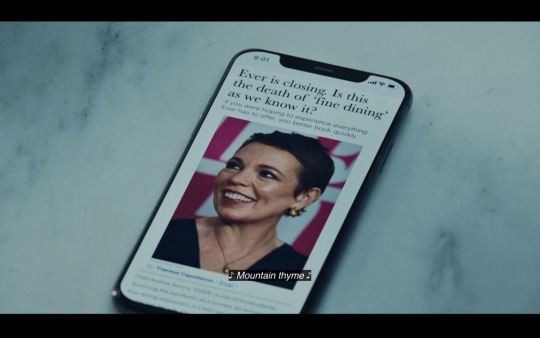
Above: Carmy's phone in 3x05 Children
Like @freedelusionshere says here, I don't think its a suprise that season 3 ended with Ever's funeral. The fine dining of Empire and even Ever is dead. How can it not be given the way its been largely running to date, as discussed above? How can it not be when we are living in a time of severe food insecurity precipitated by runaway consumerism and the twin existential threats of global climate and extinction crises. How can anyone in good conscience justify charging exorbitant amounts of money on a plate that is not going to fill patron's bellies while there are communities worldwide who do not have enough food to feed their children? When some communities, even in so-called "first world" countries like America and Australia cannot access clean drinking water?
Truly, the argument for fine dining posited by Will Guidara in 3x10 Forever made me (and I'm sure many others) actually cringe.
There's nobility in this. [...] We can give them the grace, if only for a few hours, to forget about their most difficult moments. Like, we can make the world a nicer place. All of us in this room. We have this opportunity, perhaps even a responsibility, to create our own little magical worlds in a world that is increasingly in need of a little more magic.
There *is* nobility in nurturing people, in feeding them. But in a time of the multiple and rolling, global existential crises, where particular communities are being targeted not just for marginalisation but whole scale eradication, this is not a time for more "magic"; particularly when those "little magical worlds" are reserved for the select few who can afford them. We don't need more holes to bury our heads in. We need real spaces of care that are accessible, kind (read: not nice, but kind. there is a big difference) and nurturing. And those spaces need to be those things not just for the patrons who visit them but also for the staff who work there.
There is also literally no time for escapism, at least not of the kind that late stage capitalism promotes and as described by Guidara in 3x10. We are living at a time where food systems are said to make up one third of all greenhouse gas emissions, pushing the climate crisis further to the point of no return. What's the point of making magic worlds to escape an actual world on the brink? And while your magic-making contributes to the brink getting closer? Its like putting lipstick on a pig.
Indeed some have posited that it was the British Empire's remaking of the world to feed Britain (which we've looked at briefly above) that has been the single biggest contributor to the current environmental crises facing our planet. The Bear acknowledges the issue as well. Recall 2x04 Violet when Tina visits Jerry at the farmers' market and his explanation for why he has so little produce to sell:
Jerry: There's fewer and fewer moths to grow vegetables now, and 'cause of that, there's fewer and fewer farms. Used to be you could come down here, buy everything you needed for a full menu. All in one spot. Whatever grows together, goes together.
The reason there are fewer months to grow vegetables is because of climate change which has impacted on everything to season length, groundwater and rainfall levels (as the two main sources for global farming irrigation) and increased periods of drought and heatwave.
So whats next for The Bear?
Season 3 put us through the ringer with Carmy replicating toxic practices in his restaurant that are rife in the industry at large. Yes, Carmy also has mental health issues and is a survivor of multiple sources of trauma. We know this. I've talked about this at length here and here. But he's also a guy who's running his own business with folks who are dependent on their place of work for their livelihoods. As such, he, Nat and Uncle Jimmy (as co-owners of The Bear) have responsibilities to their staff.
As EC at The Bear who is directly responsible for managing BOH, Carmy has a choice to make about whether he "blows his trauma through" (shout out to Dr Resmaa Menakem and his book My Grandmother's Hands) the bodies of those closest to him, including the crew at The Bear. Just as parents have to work on themselves so that they don't replicate harmful patterns of behaviour in raising their children, so too do we all in our daily relationships, including where many of us adults spend most of our waking lives: at work.
Like Richie observed, Carmy is not integrated in season 3 but neither is the industry in which he's working. A menu that constantly changes, wasteful food practices, a food production and agricultural industry that contributes to a third of global greenhouse gas emissions leading to increased global warming. These things are absolutely not integrated. In many ways, Carmy's mental state in season 3 - anxious, agitated, exhausted, is a reflection of the times. Given all of the above, Carmy's "I'm so fucking sick of this" in 3x09 Apologies hits me harder in the chest. Yes Carmy, you should be. Now go do something about it.
Having looked at the career trajectories of a few talented, conscientious chefs in the course of writing this meta, I think its pretty clear that the old way of running restaurants a la Chef David Fields is over. As we sit at the precipice of climate disaster, watching multiple genocides unfolding at once, during a time of massive food insecurity, who the hell has time to be suffering in the way Chef David made his employees feel in the course of making food that is meant to nourish people? What fucking cognitive dissonance is required to continue on THAT kind of a path?
Come season 4, I reckon we are going to see a massive shift in the trajectory of The Bear. This will be precipitated by multiple things (like the review Carmy got at the end of 3x10 and whatever the fuck Uncle Jimmy is up to with that box and those golf clubs lol) but most significantly, by a realisation on Carmy's part that his version of Michelin mode IS NOT IT.
I reckon Carmy and Sydney are going to continue to work together but they'll go back to the original plan they made with one another in 1x08 Braciole. They're going to go back to family style. They're going to treat their staff better (after Carmy apologises lol). They're going to shift from wasteful, haute cuisine to sustainable food practices that support producers and the planet more broadly. They're going to leave Chef David Fields' scare tactic of subtraction behind and lean into using more pepper.
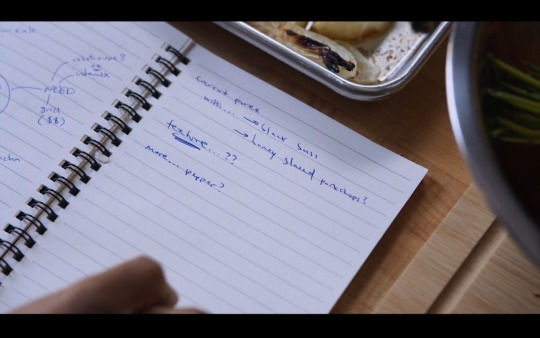
Above: Sydney's notebook as she workshops a recipe at home in 1x08 Braciole.
Tagging: @moodyeucalyptus @currymanganese @hwere @freedelusionshere @thoughtfulchaos773 @ambeauty @brokenwinebox @devisrina @espumado @fresaton @kdbleu @vacationship @birdiebats @bootlegramdomneess @mitocamdria @tvfantic87 @angelica4equity @anxietycroissant @turbulenthandholding @yannaryartside @afrofairysblog @ciaomarie
cos you may be interested but as always, I'd love to chat to whoever wants to about this stuff!
#my next meta will not be nearly as long as this...i hope.#this one took months lmao#just in time for the end of#sydcarmyweek2024#sydcarmy week 2024#the bear#the bear fx#the bear hulu#the bear meta#sydcarmy#carmen berzatto#sydney adamu#the bear season 3#mariya russell#asma khan#kasama#adejoke bakare#genie kwon#tim flores#chishuru#darjeeling express#good luck at the emmys bear crew!
94 notes
·
View notes
Note
So I'm reading your Midnight Espresso fic even tho I've never seen supernatural because I love your Soldier Boy series, plus size latina reader, that's me!! And then the "shouldn't you know about latin american myths" made me roll my eyes, like I am centroamericana y no sabía, because I've only grown up around caribbeans and my only non carribean friends are mexican (and they're still puertorican) and argentine, like so many gringos really think we are a monolith, like when I visited El Salvador recently my family would look at me in shock when I used Carribean slang that is accidentally a bad word, and I think a lot about the time my abuela got in trouble for using the Spanish word for pest (which is also a lovingly used word by salvadoreans for kids) y las viejitas carribeñas were so offended because this word means "penis" in carribean spanish, to the point where for my colombian sister it's just the word for pest but she doesn't use it because she has the carribean connotation for it, whereas my mom and abuelita called me this word when I was little, so like I don't swear in spanish because of an intergenerational family curse that caused a lot of trauma and the only way to combat it was propriety, but it's the only "swear" word I will say while I'm singing along to bad bunny
Anyways this is super off point, and I don't know how I got to this point (the long story telling in many stages is a salvadorean gene like the way uncle colm from Derry Girls tells stories), but I love your writing, and found the "I'm cuban, not guatemalan" line to be funny because yeah while speaking spanish with different people I gotta take off my "proxy carribean" hat or my "centroamericana" hat
Hola, mi amor!! 😘
First of all, thank you for reading "Midnight Espresso"! That one is very special to me, being a plus-sized Latina myself. 🌶️💅🏽
I'm also working on a Part 2 to that fic, tentatively titled "Shall We Dance." 😉
But getting into your actual comments below:
It's pretty hilarious how often I've gotten asked if I'm [insert brown ethnicity here]. Believe me, it's run the gambit. I guess I look racially ambiguous. 💁🏽♀️
But yes, a lot of people assume every Hispanic/Latino culture knows everything about the other, which is why I chose to make this reader Cuban (like myself). I couldn't accurately tell your Salvadorean experience, for example. Like of course, I can research a culture to write a character, but it wouldn't feel as natural or authentic for me to write as I did writing from my own multicultural experience.
So Dean's line:
“Shouldn’t you be an expert on this already?” Dean teases as you rifle through the pages. “I thought Latin American legends were right up your alley.”
It's tongue-in-cheek, but you're right, it's pointing to a larger issue about how most Americans view Hispanics/Latinos as a whole. 😂
And omg I could tell so many stories about me or my fam/friends getting in trouble with words other Spanish-speaking cultures don't use, or it has an entirely different meaning lmao.
For example, my Cuban ass was talking to my Dominican friend (I'm Dominican as well, but I tend to speak more like a Cuban). Cubans tend to "eat their 's'" on the ends of words. So I said something like, "aw, damn, I'm really liking the look of those tostones." Which of course, is just a fried plátano.
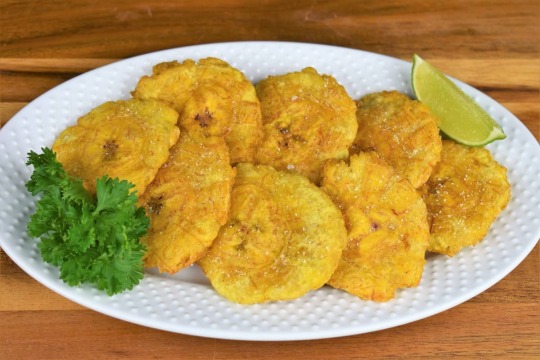
What her Dominican ass heard was "totones." Which for the English speakers in the room, is a woman's pussy. (Or translated more literally, multiple pussies.) 😂
I'm so sorry you've been scarred from cursing in Spanish, because it really can be so colorful and inventive. 😂😂
But I freakin' love Derry Girls!!! And I'm so glad you enjoy my writing, amor. Thanks so much! 😘❤️❤️
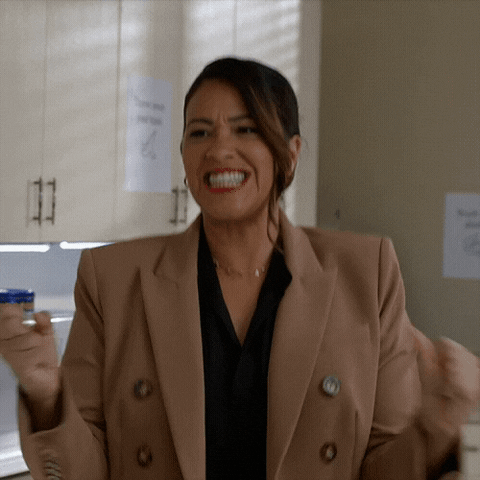
#Curvy Latinas unite#Platano Power#ask me stuff#tostones v. totones#I'm ridiculous I'm sorry 🤪#Midnight Espresso#Part 2 coming soon!#dean winchester#dean winchester x plus sized!reader#dean winchester x latina!reader#dean winchester x reader#shall we dance#writers of color#zepskies answers
7 notes
·
View notes
Text

Holy shit lmao okay. So what you are telling me is that you are uneducated about your family line. Please tell me why that prohibits you from feeling empathy toward genocide victims?
Like for context bc obviously I’m water logging this post bc it’s for me to point and jeer at and not to actually question the person involved, my Jewish family line in the US also starts primarily with my great-grandparents. And they were Eastern European Jews, so you do the math. Firstly, I think anyone whose parents/grandparents/great-grandparents were Holocaust victims would and should kick my ass if I tried to portray myself as the dictionary definition of a victim because of this. Which is not to say there isn’t Holocaust-related intergenerational trauma in my family, but that it’s very clear I should not be at the front of any convo about how the Holocaust affects victims today.
Secondly, my uncle has taken on an incredibly intensive genealogy process, and guess what! We have lots of family members all over the world! Like, currently! They are alive! And again, that’s not to say I don’t mourn those who were brutally murdered, but that it is factually untrue to say I have no family members outside of what comes from my great-grandparents’ line. Lol. Lmao even.
1 note
·
View note
Photo
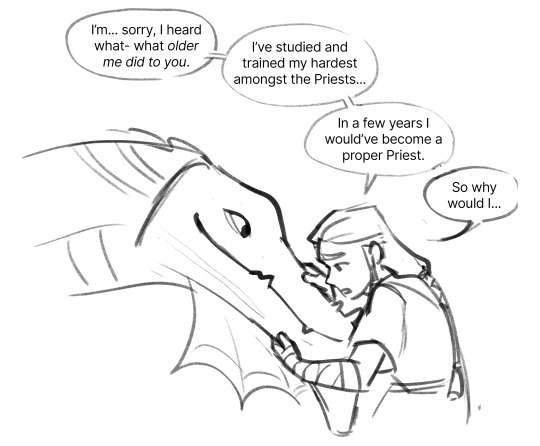
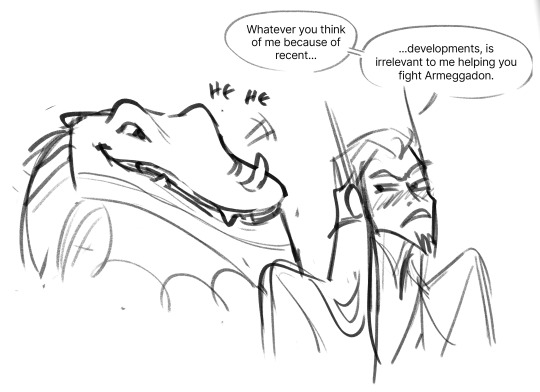
More on that de-aged Word AU.
more rambly thoughts:
I’m more than aware of how canon Word is nigh impossible to redeem satisfactorily. That brief flashback from Connor, paints a pretty damning picture of Word (It is from Connor’s POV though, but Alchemist sort of affirms it). So canon Word’s defection is personally motivated, yadda yadda.
In my tweaks I enjoy the idea of Word and Connor being pressured a whole lot in the Priesthood to study and train (as child soldiers lbh). Given the seclusion and indoctrination... guess what preoccupies their minds? The DHW and being strong enough to survive/fight it. So it’s not farfetched to rewrite Word’s dabbling into foreign, potentially unethical gear experiments, as an attempt to revive the craft to arm the Priests against the coming war.
This motive + his banishment, leads to a bitter Word who struggles on the streets. Word meets Zulay Paynn (yasss he took her last name because doing this also gives the family name more history/depth seeing that Zulay’s the Dragon Eye’s leader), long-time Down City citizen and leader of a notorious crew of crooks, with dubious morals and greed and ambition for Sun City, her influence on him results in Word going “Fuck it, I’m going to use this knowledge for myself.”
Basically, I envision Word to have lived a life of asceticism and probs has less reason to envy life above (The DHW is most important of all), until he becomes disillusioned with his banishment (Because rationally, if I’m training like hell for a war already, why the hell are we not making weapons??) and with Zulay’s less than positive influence... that results in the Word we see in present day. Zulay’s death likely cements his obsession even further, IF Zulay doesn’t chicken out at motherhood like in canon lol (this show’s track record with women I swear). Because she died for this war, this goal of theirs, what kind of partner would he be if he didn’t follow through it to the very end?
And then of course, we come to the neglect of Moordryd, and just ouch. There’s so much potential there, for this narrative of Word finally, finally, letting go of the past, and living for a future with his son by the end of the series. IF we had gotten a more complex Word and Moordryd whose redemption is hinted from the very beginning (imagine.. a Moordryd who sympathises Lance losing his father in the very beginning, who feels bad after being an ass in the races because of that? IMAGINE). Give me a Word that actually tries to parent, whom I don’t question after the BBEG is defeated. In canon, after Armeggadon is defeated, what happens to Word?? How on earth do we resolve the series satisfactorily??? Attempting to redeem canon Word in his current state leaves a bad taste in my mouth. I’m not saying he needs to do it out of the good of his heart lol, but that he’d do it for his son? Oogh, that’s the good stuff, putting down things with Zulay after almost 20 years of doing it alone?? Yeah.
Gosh, the emotions that we could’ve milked from the extremely fraught Paynn family.
#dragon booster#screaming about this family all the damn time#idk if there's an equivalent disaster family out there#there probably is#complex villainous fathers#I wouldn't be thinking all this if meggy wasnt in the picture#and zulay wasnt hinted or had the potential to be an evil girl boss lol#like look at atla for comparison#lord ozai is similar to word but there's not Even Bigger Villain replacing him#so it works#i wouldnt waste my breath redeeming bbeg word lmao#but bruh i couldve gotten like turning red/encanto styled family resolution#i guess intergenerational trauma LMAO#it kills meee#maybe i'm only capable of seeing this because I'm southeast asian lmao#in all my art Word and zulay have never been white#psft#yeah#i can dream I guess#word paynn#beau#deaged au
22 notes
·
View notes
Text
Hi, besties! I’m back to talk about Encanto and Encanto only because I’m tired of non-latinos/Hispanics posting their bland ass opinions on a movie they definitely did not care to understand <3 ( warning: spoilers, I guess)
1. "Abuela was evil and didn't deserve to be forgiven that quickly"
Amix, did we even watch the same movie? Because to me Alma wasn't forgiven on the spot. Not one of them said "sure abuelita don’t worry we still love you." And the thing is, in a toxic Hispanic household, you won't get an apology so easily. Alma admitted how she fucked up and that is a huge step for them as a family to start figuring out their own shit and how each member contributed to the cracks appearing. The moment where they all come together to rebuild their Casita is a perfect depiction of that; it takes days, months and years to pick up the pieces and put it back together, and maybe just then they can start healing.
Alma deserved to realise how much pain she was putting her family through and be given the opportunity to try to be better, and saying otherwise is interpreting the movie to fit your ideal ending. And the thing is, Alma had no malicious intent in her words and actions, once you know what happened to her, you notice everything she does and says is tightly tied to her traumatic past: bestie watched her town be invaded, her husband brutally murdered while holding her newborn triplets, became the leader of a whole ass new town the next morning and was probably never given the time to mourn.
And before any of y’all Abuela-haters come to me to say trauma is never an excuse: yeah, abuse can’t be justified under any circumstances, however, if you want to criticise Abuela’s character, you have to look where she is coming from. It’s not a matter of it’s fair or not, because in real life these situations most of the time are never fair to anyone involved.
2. "Omg, everyone was so mean towards Mirabel and Bruno, how could anyone allow that? That's so fucked up!"
Oh, wow, the privilege of watching a movie about intergenerational trauma and not noticing the trauma. Qusiese, chicaaa, pero no pudiese. LMAO I was going to go into how Alma, Isabela and Pepa treated Mirabel, but I feel that’ll be better left alone in their separate posts because it’s a lot. Instead I’m just going to explain why I think “We don’t talk about Bruno” was an attempt to protect Bruno from people shit-talking him even more.
It’s undeniable that the Madrigal family is obviously the equivalent of royalty in Encanto. They are a public figure and Abuela specifically works her ass off trying to maintain that image (yeah, by manipulating her family into being of service but). Because if shit went down, then she’d find herself having to flee her home again. Big yikes, nope.
Now, imagine, your youngest and only son who can see the future comes up with a prophecy about your home/family so bad that he runs away. Bruno may have done nothing wrong, but his disappearance brought a bad image to the family. So what did the family had to do to save face? Not talk about him. And more than it being a “fuck Bruno, all my homies hate Bruno” move, it is more of a “Hey, this is a sensitive topic and we as a family have decided to speak no more of it, thanks!” move, not only to cope with his absence, but to prevent townsfolk from also talking about him. It might not have been the nicest thing to do, but so was Bruno’s leaving without saying more. Please, stop infantilizing grown-ass men.
3. “The magic doesn’t make any sense”
HI, Welcome to Magical Realism! It does not need to make sense to you. It is what it is in its own world and its inhabitants accept it. If y’all can watch Marvel movies and eat that shit up as if it were the most complex worldbuilding in existence, then you can absolutely believe that miracles are a commonly accepted occurrence in this world.
What creates a miracle is not really important, because throughout the movie we’re not trying to make a new one, but to preserve the one that already Alma manifested. What determines what kind of gift each character gets is not important, or at the very least I’d think you’d be able to assume that it’s something related to their personality or a skill they excelled at. Being utterly rude, if you whine over how the magic doesn’t make any sense, I feel like you’re the type of person who wants to have every single thing explained in detail because you’re simply too lazy to use your imagination.
I find the magic in this movie very adequate to its context; in Latin-America, when you talk about a miracle it’s something of religious origin that cannot be explained by science (as opposed to English, in which it can be simply boiled down to something extraordinary). Additionally, “Milagro” is also used to refer to religious charms that can be carried on your person for protection and good luck. So, the candle serves as both types of miracles and I find that so damn cool.
Now, I’m not blindly in love with this movie to deny the fact that it definitely should’ve explored its world and characters so much more. It’s not perfect, but it’s definitely one of the best movies the mouse has made in years and I do hope it gets some kind of show or whatever; it’s got the perfect elements for it.
P.d: do yourself a huge favour and listen to the Spanish version of Dos Oruguitas <3<3<3
#encanto#disney encanto#madrigal family#Alma Madrigal#Mirabel Madrigal#abuela madrigal#Bruno Madrigal#I have so many thoughts about Encanto#and I'm gonna make it y'all's problem#and LISTEN#If you're not Latino Hispanic you can obviously give your opinion on it#but please don't boil it down to uwu gay rights <3 love wins ND representation#when the movie is CLEARLY about a very important problem in Latin-American Families#This is my 1/50 Encanto post lmao#this is queued btw because I'm tired af#I'll still be a bit afk tho#I'm still annoyed by that update thing#les tkm se me cuidan#any encanto fans can come discuss stuff with me I'd love to! <3
846 notes
·
View notes
Note
What’s a movie or show that everyone loves that you don’t think thats good
Those are a lot of movies, lmao.
I remember when everyone was gushing about The Town and I was like, it's a typical bank robber movie, why is this getting lauded?
Honestly, kind of anything from Guillermo del Toro, which I know is blasphemy but every time I watch a movie of his I'm like, I expected to be way more moved than I was, the only movie that has stayed with me was Pan's Labyrinth but I remember everyone going OFF about Shape of Water and I was like .... I guess? I just feel like it's pretty.
I haven't spoken about this in years because it created this whole thing on my blog but I really fucking hate Frozen and I think Tangled was better.
I expected Brave to be much better.
Any Marvel movie that isn't Black Panther, Ragnarok and even though most of the cast is shitty the first GotG.
I didn't think American Hustle was that great and I was disappointed because I went in expecting to love it.
In the Jennifer Lawrence vein, I don't dislike Silver Linings Playbook, I just think it was way overhyped for something that was, at most, decent.
OK this one is different because unless you're racist, you don't love Birth of a Nation but I'm including it because I'm tired of film school/cinema programs including it in the syllabus. I had to watch that movie at least once a year in undergrad because every film class played it.
I found Inglorious Basterds to be pretty forgettable tbh and while I actually do like Christoph Waltz's performance and his other performances, I think Hans Landa is an overrated villain.
The Harry Potter movies are like, it's not that I don't love them because I have so much childhood nostalgia wrapped up in them and me and my friends were kind of a mess about the last movie coming out because it meant the end of something for us, but after I would say the third movie, they're not good movies and I feel like we should be honest about that. There was a slight return to form in Part 1 of the Deathly Hallows although people got bored with the camping sequences but yeah.
I didn't see La La Land but I just know in my bones that if I ever did see it I would just be like, oh.
I haven't watched much Hitchcock but I feel like I'm just not a fan based on what I have seen i.e. North by Northwest, I wanted to riot in my class. That stupid fucking plane.
I should rewatch Black Swan but I remember when I did watch it I was like THIS is what everyone is freaking out over? Anyway.
I concede that Mad Max Fury Road is a visual spectacle but that's all it is so everyone freaking out about it had me like, it just does some cool things here and there, why is this an AMAZING movie?
Avatar is just a horrible movie.
Crash is so extremely racist while pretending not to be racist and it was SO lauded.
I think Spencer was a pretty film but I think people overhyped Kristen's performance in it, so much work seemed to be trying to sound like Diana and it just became a breathy mess imo.
And finally, Encanto. I went back and forth with a lot of anons about this one, but the structure and narrative of this movie was a complete mess.
And just in case this becomes another Frozen incident, I'm just linking the back-and-forths I did with anons here so people can read them if they want:
5 notes
·
View notes
Text
oh yeah lmao my fyucking lore
uhhh i really only want to talk about delta today because he’s my boy. i mentioned in response to an ask a few weeks ago about rich and tiber that delta had been purposefully avoiding rich, even when the rest of the clan had long since moved past the initial distrust.
although it is forbidden in the clan to make light of delta’s trauma (not one of delta’s rules. but if anyone jokes about that shit they have to answer to luke), there were a few moments where people absently advised rich to maybe not go near delta. especially not when delta was handling any kind of heavy equipment or weapon-like object (lots of dockwork involves heavy wood planks and crowbars, soo)
rich doesn’t believe himself in any way linked to or responsible for his mother’s actions. what xandra did was entirely unrelated to rich. rich has a rather disconnected, dispassionate view of his family (except his younger twin brothers, he’s very protective of them) and sees himself as an individual rather than a prince or whatever. he is also very quiet and a little shy, and he would never be one to force a conflict with delta over intergenerational trauma. rich is more a live and let live kinda guy
anyway, delta avoids him. like the plague. now tiber has been taking precognition ‘lessons’ with rúth, which often leaves rich and luke just kinda sidelined together, and delta has found that he can’t even spend time with his own sibling without being around rich. everyone just assumes that delta hates rich and is purposefully limiting the time they spend in proximity, for fear of making poor decisions in a fit of anger. which has, historically, been one of delta’s worst traits.
what nobody knows is that delta is more embarrassed than angry. and it’s kind of hard to work up the nerve to apologise to someone & welcome them to the clan when everyone in the entire clan thinks that he could snap and murder this potential newcomer at any moment. but that’s the reputation u get, i guess
5 notes
·
View notes
Note
omg i love that YOU loved getting my message!! i wasn't familiar with the term intergenerational trauma until i read your message but i can guess what it is LOL. ahh for my dev psy module we had one assignment that was like ... w r i t e y o u r o w n o r b i t u a r y LMAO. omg i can send you my paper but that's boring asf djkf and idt it's like super detailed sadly but my paper was related to julie gregory's autobiography 'sickened' which is on mbp if you wanna check that book out!
write your own obituary!! that’s HEAVY to say the least!! ty for the tip, i’m definitely going to check that book out!!!! & you can def come off anon (if you want to!) & send me the paper (:
0 notes
Text
today's late night revelation is that the reason no one can ever tell that I'm falling apart is that I was punished by my abuser for crying and asking for help from ashe 6-7 ��🙃🙃🙃
#how do you fix this?????#how was this allowed to happen to me????#how did nod nobody!!?? Notice!?!?!#god isn't real bc any would he have let this happen to a child what could i have done#the inherent guilt of being catholic lmao i wasnt even raised to believe or prayer but i guess i still get to have the worst bits#intergenerational catholic trauma????? it's a mystery#disappointing but not a surprise: i am#unlovable#idek how to meet people how would i ever find someone kind enough to love me lmao#i just sabotage anything good that could possibly happen to me so that#so that nothing bad ca n happen#i dont wanna get my hopes up over something that matters bc chances are i lose#I've had a headache for 2 hours but now im too upset to sleep#what's left of the someone i could have become isn't even a person anymore#i wanna choke till i die#choke me choke me choke me
0 notes